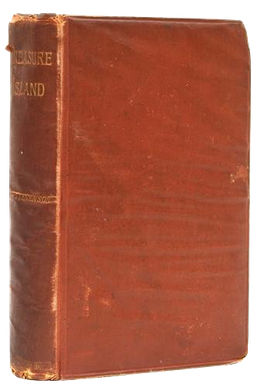
Treasure Island is an adventure and historical novel by the Scottish author Robert Louis Stevenson. It was published in 1883, and tells a story of "buccaneers and buried gold" set in the 1700s. It is considered a coming-of-age story and is noted for its atmosphere, characters, and action.

Annie Oakley is an American Western television series that fictionalizes the life of the famous Annie Oakley. Featuring actress Gail Davis in the title role, the weekly program ran from January 1954 to February 1957 in syndication. A total of 81 black-and-white episodes were produced, with each installment running 25 minutes in length. ABC aired daytime reruns of the series on Saturdays and Sundays from 1959 to 1960 and then again from 1964 to 1965.

Elizabeth Mary Furness was an American actress, consumer advocate, and current affairs commentator.

Lionel Alfred William Atwill was an English and American stage and screen actor. He began his acting career at the Garrick Theatre. After coming to the United States, he appeared in Broadway plays and Hollywood films. Some of his more significant roles were in Captain Blood (1935), Son of Frankenstein (1939) and To Be or Not to Be (1942).

Mystery of the Wax Museum is a 1933 American pre-Code mystery-horror film directed by Michael Curtiz and starring Lionel Atwill, Fay Wray, Glenda Farrell, and Frank McHugh. It was produced and released by Warner Bros. and filmed in two-color Technicolor; Doctor X and Mystery of the Wax Museum were the last two dramatic fiction films made using this process.

Night Monster is a 1942 American black-and-white horror film featuring Bela Lugosi and produced and distributed by Universal Pictures Company. The movie uses an original story and screenplay by Clarence Upson Young and was produced and directed by Ford Beebe. For box office value, star billing was given to Bela Lugosi and Lionel Atwill, but the lead roles were played by Ralph Morgan, Irene Hervey and Don Porter, with Atwill in a character role as a pompous doctor who becomes a victim to the title character, and Lugosi in a small part as a butler.
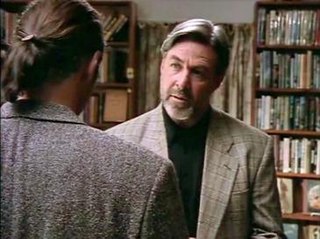
Joe Dawson is a fictional character in the Highlander franchise, created for the live-action TV show Highlander: The Series. A marine who leaves active service after losing his legs during the Vietnam War, he finds a new calling by joining the order of Watchers, people who record the lives and actions of immortals who secretly live on Earth. His main assignment during the course of the show is to chronicle the life of protagonist Duncan MacLeod, an immortal swordsman born in the Scottish Highlands. When the Highlander learns about the Watchers, he meets Joe and the two eventually become friends. Joe Dawson is portrayed by actor Jim Byrnes.

Treasure Island is a 1934 film directed by Victor Fleming and starring Wallace Beery, Jackie Cooper, Lionel Barrymore, Lewis Stone, and Nigel Bruce. It is an adaptation of Robert Louis Stevenson's famous 1883 novel of the same name. Jim Hawkins discovers a treasure map and travels on a sailing ship to a remote island, but pirates led by Long John Silver threaten to take away the honest seafarers’ riches and lives.

The Hound of the Baskervilles is a 1939 American gothic mystery film based on the 1902 Sherlock Holmes novel of the same name by Sir Arthur Conan Doyle. Directed by Sidney Lanfield, the film stars Basil Rathbone as Sherlock Holmes and Nigel Bruce as Dr. John Watson. Released by 20th Century Fox, it is the first of fourteen Sherlock Holmes films produced between 1939 and 1946 starring Rathbone and Bruce.

William Worthington was an American silent film actor and director.

Captain America is a 1944 Republic black-and-white 15-chapter serial film loosely based on the Timely Comics character Captain America. It was the last Republic serial made about a superhero. It also has the distinction of being the most expensive serial that Republic ever made. It stands as the first theatrical release connected to a Marvel character. The film was re-released in 1953 and it was released in Turkey in popular before the release of the original comics, Turkish Captain America films was also produced such as 1968 film Binbaşı Tayfun and 1973 film 3 Dev Adam. It was the first live-action rendition of a Marvel character before Captain America live action segmnet by Arthur Pierce of the 1966 television series The Marvel Super Heroes in 1966, and Spider-Man appeared in the Spidey Super Stories segment of the children's television series The Electric Company in 1974.

Billy Bones is a fictional character appearing in the first section of Robert Louis Stevenson's 1883 novel Treasure Island.
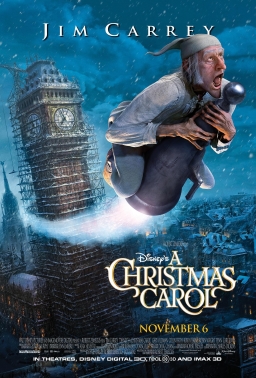
A Christmas Carol is a 2009 American animated Christmas fantasy film produced, written for the screen and directed by Robert Zemeckis. Produced by Walt Disney Pictures and Zemeckis's ImageMovers Digital, and released by Walt Disney Studios Motion Pictures, it is based on Charles Dickens's 1843 novel of the same name. The film was animated through the process of motion capture, a technique used in ImageMovers's previous animated films including The Polar Express (2004), Monster House (2006), and Beowulf (2007), and stars the voices of Jim Carrey, Gary Oldman, Colin Firth, Bob Hoskins, Robin Wright Penn and Cary Elwes. It is Disney's third adaptation of the novel, following Mickey's Christmas Carol (1983) and The Muppet Christmas Carol (1992).

Jameson Thomas was an English film actor. He appeared in more than 80 films between 1923 and 1939.
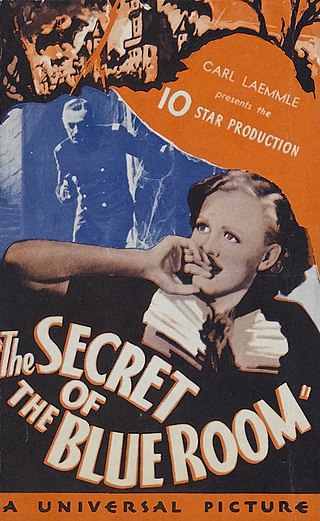
The Secret of the Blue Room is a 1933 American pre-Code mystery film directed by Kurt Neumann and starring Lionel Atwill, Gloria Stuart, Paul Lukas, and Edward Arnold. A remake of the German film Geheimnis des blauen Zimmers (1932), it concerns a group of wealthy people who stay at a European mansion that features a blue room that is said to be cursed, as everyone who has stayed there has died shortly after. Three people suggest a wager that each can survive a night in the blue room.

A spark is an incandescent particle. Sparks may be produced by pyrotechnics, by metalworking or as a by-product of fires, especially when burning wood.
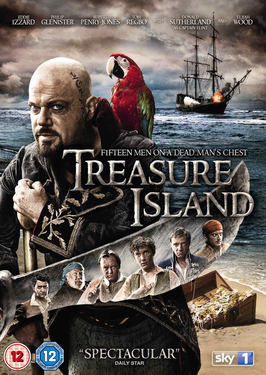
Treasure Island is a two-part British television drama adaptation of the novel Treasure Island (1883) by Robert Louis Stevenson. The screenplay was written by Stewart Harcourt, produced by Laurie Borg and directed by Steve Barron. It was made by BSkyB and first shown in the United Kingdom on Sky1 on 1 & 2 January 2012. It was re-released a year later on Pick on the 14 February 2013 and 21 February 2013.

The Mad Doctor of Market Street is a 1942 American horror film produced by Universal Pictures starring Lionel Atwill. The film was a low-budget project that utilized the studio's contract players and gave rising director Joseph H. Lewis an opportunity to demonstrate his versatility with little production money.

The Firebird is a 1934 American murder mystery film starring Verree Teasdale, Ricardo Cortez, Lionel Atwill and Anita Louise, directed by William Dieterle and produced and released by Warner Bros. It is based on the 1932 play by Lajos Zelahy. The Firebird suite by Igor Stravinsky is heard occasionally during the film.
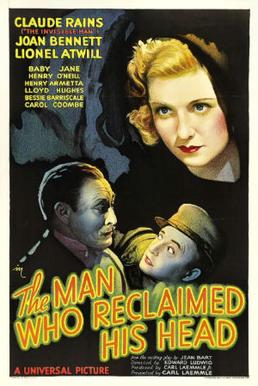
The Man Who Reclaimed His Head is a 1934 American drama film directed by Edward Ludwig and written by Jean Bart and Samuel Ornitz. The film stars Claude Rains, Joan Bennett, Lionel Atwill, Juanita Quigley, Henry O'Neill and Henry Armetta. The film was released on December 24, 1934, by Universal Pictures.




















